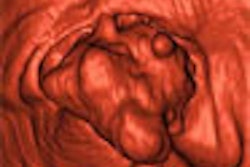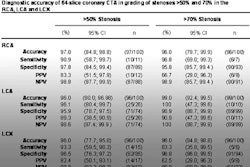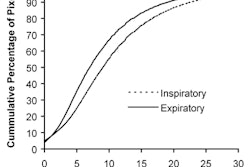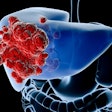PHOENIX - Multidetector CT has arguably become the primary diagnostic tool in U.S. emergency departments, but special care and consideration are necessary when using the modality with pregnant woman, according to a presentation at the 2006 Society of Computed Body Tomography and Magnetic Resonance (SCBT/MR) meeting on Tuesday.
According to one study (Journal of Trauma Injury, Infection and Critical Care, February 2000, Vol. 48:2, pp. 354-357), 30% of female patients in a major trauma center were of childbearing age, and 15% of these patients were either definitely or possibly pregnant -- making fetal radiation exposure during diagnostic imaging of the mother an issue facing both clinicians and diagnosticians.
"This is a great source of anxiety for the mother, providers, and for radiologists," said Dr. Donald Frush.
Frush, a professor of radiology and director of the division of pediatric radiology at Duke University School of Medicine in Durham, NC, discussed the risks of multidetector CT (MDCT) use during pregnancy at the SCBT/MR meeting.
Frush emphasized that there is no universal policy or guideline for the use of MDCT during pregnancy. "Basically it's up to everyone to make a decision based on their own experience and the standards of practice within their community and their region," he said.
The radiation risks to the fetus are dependent on its age and stage of development. High fetal doses can lead to abortion, reduced body size, central nervous system damage, retardation, and an increase for the future risk of developing cancer. The effects depend on a combination of dose and gestational age, Frush said.
In estimating fetal dose from MDCT, the fetus should be considered as an "organ" in terms of measurement, he said. Thus, a head CT on the mother would result in a minimal radiation dose to the fetus, while an abdominal/pelvis CT would provide a much higher dose of ionizing radiation to the fetus. Although calculating estimates for MDCT dose are problematic, abdomen/pelvis CT exams are likely to produce 50 mGy of fetal radiation, Frush said.
According to the International Commission on Radiological Protection (ICRP) Publication 84, "Pregnancy and Medical Radiation," malformations have a threshold of 100-200 mGy or higher and are typically associated with central nervous system problems. The ICRP states that for an individual exposed in utero to 10 mGy, the absolute risk of cancer at ages 0-15 is about one excess cancer death per 1,700.
Frush believes that although the risk from a single MDCT exam during pregnancy is negligible, there is risk and the modality's use must be justified in each and every instance. He advocates documenting an imaging policy for MDCT use in pregnancy.
The policy should include a risk-management algorithm that incorporates input from emergency department physicians, radiation physicists, obstetricians, and radiologists. Alternate modalities such as ultrasound and MR should be explored for efficacy prior to ordering a CT study. In addition, MDCT imaging technique adjustments should be developed to provide the lowest possible dose to an expectant mother while maintaining acceptable image quality. For obvious reasons, retakes are not a viable option under these circumstances.
The University of Iowa has created a policy to expedite imaging studies when pregnant patients are involved, while limiting fetal radiation dose. The policy and consent form for CT exams conducted during pregnancy was published in the American Journal of Roentgenology (August 2003, Vol. 181:2, pp. 335-340).
If an MDCT exam is deemed necessary and consent is obtained from the mother, provider, and radiologist, the risk of fetal complications from radiation dose are low, according to the ICRP.
"Prenatal doses from most properly performed diagnostic procedures present no measurable increased risk of prenatal death, malformation, or mental impairment," the commission wrote.
By Jonathan S. Batchelor
AuntMinnie.com staff writer
April 5, 2006
Related Reading
Radiation experiment demonstrates long-term damage to normal tissue, March 31, 2006
MDCT in pregnant women yields low fetal doses, March 27, 2006
BEIR VII and separating fact from fear, November 18, 2005
Even in pregnancy, CT rules for ruling out PE, August 8, 2005
Study shows radiation causes cancer but rarely, June 30, 2005
Copyright © 2006 AuntMinnie.com



















